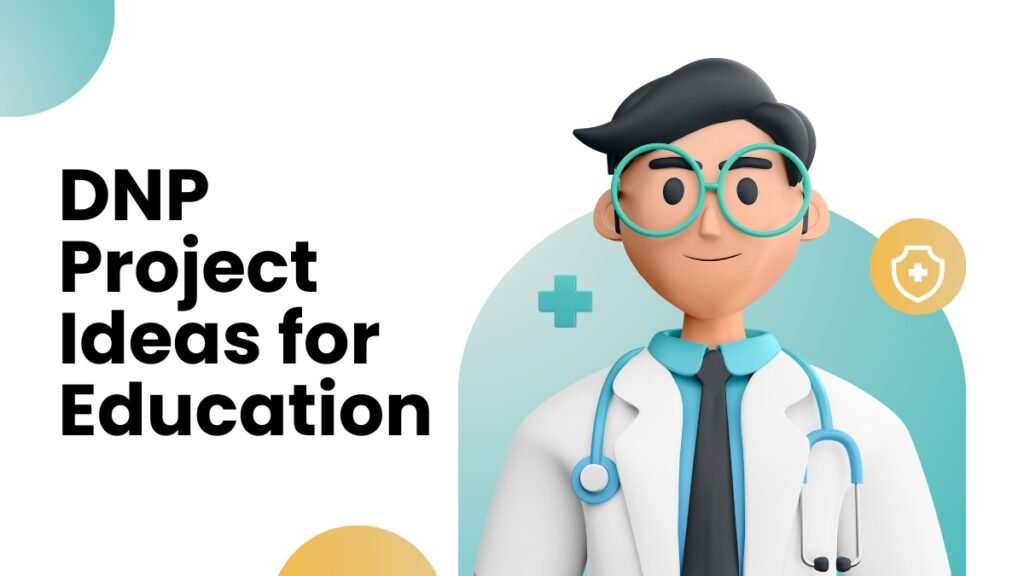Explore groundbreaking DNP project ideas for education with our comprehensive guide. Uncover practical tips and creative examples designed to help you shape impactful nursing education initiatives. As a DNP student, your project can revolutionize nursing training and enhance patient care.
Why focus on education? Improved training for nurses leads to better patient outcomes. Your project can redefine how nurses are educated and prepared for real-world challenges.
Dive into ideas for curriculum enhancements, novel teaching methods, and more. We’ll also provide resources to kickstart your journey.
Ready to make a meaningful impact? Find the perfect DNP project and get started today!
DNP Project Ideas for Education PDF
Importance of DNP Projects in Nursing Education
Doctor of Nursing Practice (DNP) projects are key to improving nursing education. Here’s how:
- Innovate: Turn research into new teaching methods and updated curricula.
- Boost Skills: Create better-prepared nurses with essential skills for high-quality care.
- Lead: Develop leadership skills in data analysis, communication, and program evaluation.
- Solve Problems: Address real challenges like faculty development or student engagement.
- Share Knowledge: Contribute to the field by sharing your findings and improving practices.
In short, DNP projects help bridge theory and practice, making nursing education better and more effective.
Key Areas for DNP Project Focus in Education
Doctor of Nursing Practice (DNP) projects in education offer great opportunities to make a lasting impact. Here are key areas where you can focus your project:
Curriculum Development
- Explore new models like flipped classrooms or case studies.
- Integrate important topics such as cultural competency or interprofessional collaboration.
- Develop simulations or engaging activities for specific nursing skills.
Teaching Methods
- Assess the effectiveness of methods like active learning or problem-based learning.
- Create tech-based strategies, such as mobile apps or online simulations.
- Develop programs to help faculty learn new teaching skills.
Assessment and Evaluation
- Review current assessment methods for measuring student competence.
- Design new tools like portfolios or self-reflections for a fuller picture of learning.
- Create rubrics to ensure fair and consistent evaluations.
Technology in Education
- Propose and test educational technologies like virtual reality or online platforms.
- Develop instructional materials using these technologies.
- Assess the impact of tech on student learning and engagement.
Faculty Development
- Create programs to help new faculty transition to teaching roles.
- Promote mentoring and collaboration among faculty.
- Address specific needs in curriculum development, teaching methods, or tech use.
Choose a project area that excites you and can make a real difference in nursing education.
DNP Project Ideas for Education
Check out DNP project ideas for education:-
Curriculum Development and Implementation
Cultural Competency Workshops
- Description: Create workshops and case studies to teach nursing students about cultural diversity in healthcare.
- Key Concepts: Cultural competence, patient-centered care.
Simulation for Critical Thinking
- Description: Develop simulations to help nurses practice decision-making in high-pressure scenarios.
- Key Concepts: Simulation-based learning, crisis management.
Population Health Modules
- Description: Design modular courses focused on population health management strategies.
- Key Concepts: Population health, epidemiology.
Evidence-Based Practice Integration
- Description: Add projects and case studies to teach students how to use research in clinical practice.
- Key Concepts: Evidence-based practice, research utilization.
Interprofessional Projects
- Description: Create joint projects with other healthcare disciplines to improve teamwork and communication.
- Key Concepts: Interprofessional education, collaboration.
Pediatric Nursing Curriculum
- Description: Develop a specialized curriculum for pediatric nursing with hands-on practice and simulations.
- Key Concepts: Pediatric nursing, hands-on learning.
Advanced Practice for Rural Areas
- Description: Create content for advanced practice nurses working in rural settings, addressing unique challenges.
- Key Concepts: Rural healthcare, resource management.
Online Nursing Ethics Course
- Description: Design an online course covering modern nursing ethics with interactive modules.
- Key Concepts: Nursing ethics, online learning.
Obstetrics and Gynecology Simulations
- Description: Develop simulations for common scenarios in obstetrics and gynecology.
- Key Concepts: Obstetric simulations, gynecological procedures.
Advanced Pain Management Curriculum
- Description: Create a curriculum for advanced techniques in pain management, including case studies and simulations.
- Key Concepts: Pain management, pharmacology.
Teaching Methodologies and Strategies
Flipped Classroom for Pharmacology
- Description: Use a flipped classroom model where students learn content at home and apply it in class through problem-solving.
- Key Concepts: Flipped classroom, active learning.
Medication App Development
- Description: Build an app with tutorials and quizzes on medication administration for self-directed learning.
- Key Concepts: Mobile learning, medication administration.
Problem-Based Learning in Ethics
- Description: Use problem-based learning to explore nursing ethics through real-world scenarios.
- Key Concepts: Problem-based learning, ethical dilemmas.
Gamification in Nursing Education
- Description: Create educational games to make learning more engaging with features like leaderboards and rewards.
- Key Concepts: Gamification, student engagement.
Peer Teaching in Skills Labs
- Description: Use peer teaching to help students learn clinical skills through collaboration and feedback.
- Key Concepts: Peer teaching, clinical skills.
VR for Anatomy Learning
- Description: Develop VR modules to provide immersive anatomy lessons with interactive 3D models.
- Key Concepts: Virtual reality, anatomy education.
Interactive Online Case Studies
- Description: Design interactive case studies for online courses to boost critical thinking and application of knowledge.
- Key Concepts: Interactive case studies, online learning.
Collaborative Learning Platforms
- Description: Implement online platforms for group projects and discussions to foster collaborative learning.
- Key Concepts: Collaborative learning, online platforms.
Emergency Nursing Simulation
- Description: Create simulations for emergency care training, focusing on rapid decision-making and skill application.
- Key Concepts: Emergency nursing, simulation-based learning.
Educational Podcasts
- Description: Develop podcasts on nursing topics to enhance learning and engagement.
- Key Concepts: Podcasts, educational technology.
Assessment and Evaluation of Learning Outcomes
Portfolio-Based Clinical Assessment
- Description: Use portfolios for students to document and reflect on clinical experiences, offering a comprehensive assessment of skills.
- Key Concepts: Portfolio assessment, clinical reflection.
Standardized Rubrics for Online Discussions
- Description: Create rubrics to fairly assess student participation and critical thinking in online discussions.
- Key Concepts: Rubrics, online discussions.
Evaluation of Simulation Learning
- Description: Develop methods to assess learning outcomes from simulation exercises, including feedback and performance metrics.
- Key Concepts: Simulation evaluation, performance metrics.
Peer-Assessment Tools
- Description: Design tools for students to assess each other’s clinical skills and provide constructive feedback.
- Key Concepts: Peer assessment, clinical competencies.
Self-Assessment Toolkit
- Description: Create tools for students to evaluate their own learning and set goals.
- Key Concepts: Self-assessment, personal development.
Competency-Based Assessment Models
- Description: Assess how competency-based assessments impact student outcomes and skill development.
- Key Concepts: Competency-based assessment, skill development.
Longitudinal Skill Assessment Framework
- Description: Develop a framework to track and assess clinical skills over time.
- Key Concepts: Longitudinal assessment, skill tracking.
Innovative Formative Assessment Tools
- Description: Design new tools for formative assessment to support learning with quizzes and interactive exercises.
- Key Concepts: Formative assessment, interactive tools.
Digital Assessment and Feedback Platform
- Description: Create a digital platform for managing assessments and providing feedback to students.
- Key Concepts: Digital platform, assessment management.
Automated Assessment Tools
- Description: Evaluate how automated tools can be used for educational assessments and their impact on learning.
- Key Concepts: Automated assessment, learning impact.
Technology Integration in Education
VR for Safe Patient Handling
- Description: Test VR simulations for teaching safe patient handling techniques and measure their effectiveness.
- Key Concepts: Virtual reality, patient handling.
Online Modules for Interprofessional Training
- Description: Create online modules to train healthcare professionals in collaboration and teamwork through case studies and role-playing.
- Key Concepts: Online learning, interprofessional collaboration.
AR for Nursing Skills
- Description: Use augmented reality to develop interactive training for nursing skills with 3D models and real-time feedback.
- Key Concepts: Augmented reality, nursing skills.
E-Learning Platforms for Clinical Education
- Description: Evaluate the impact of e-learning platforms on clinical education, focusing on student outcomes and engagement.
- Key Concepts: E-learning, clinical education.
Interactive Webinars
- Description: Develop engaging webinars with live discussions, Q&A, and case studies for continuing education.
- Key Concepts: Webinars, continuing education.
Mobile Learning Platform
- Description: Create a mobile platform for on-the-go continuing education with features for tracking progress.
- Key Concepts: Mobile learning, accessibility.
Wearable Tech for Training
- Description: Explore using wearables to provide real-time feedback and enhance skills training.
- Key Concepts: Wearable technology, real-time feedback.
Virtual Lab for Clinical Skills
- Description: Design a virtual lab for practicing advanced clinical skills with simulations and interactive exercises.
- Key Concepts: Virtual lab, clinical skills.
AI in Educational Assessments
- Description: Assess how artificial intelligence tools can improve accuracy and efficiency in educational assessments.
- Key Concepts: Artificial intelligence, educational assessments.
Interactive Evidence-Based Practice Platform
- Description: Develop a platform to support learning and application of evidence-based practice with case studies and collaborative tools.
- Key Concepts: Evidence-based practice, interactive learning.
Faculty Development and Support
Mentorship for New Educators
- Description: Set up a mentorship program to help new faculty transition into teaching roles with guidance and support.
- Key Concepts: Mentorship, professional development.
Tech Training Workshops
- Description: Organize workshops to teach faculty how to effectively use new educational technologies.
- Key Concepts: Educational technologies, faculty training.
Faculty Resource Center
- Description: Create a center with resources, workshops, and training for faculty to support their professional growth.
- Key Concepts: Resource center, professional development.
Peer Review System
- Description: Implement a peer review system to help faculty improve their teaching practices through feedback.
- Key Concepts: Peer review, teaching practices.
Faculty Wellness Program
- Description: Develop initiatives to support faculty wellness with stress management workshops and mental health resources.
- Key Concepts: Faculty wellness, stress management.
Online Faculty Training Modules
- Description: Design online modules covering teaching strategies, technology use, and career development for faculty.
- Key Concepts: Online training, faculty development.
Faculty Conferences
- Description: Host annual conferences to share innovative teaching strategies with presentations and networking opportunities.
- Key Concepts: Faculty conferences, teaching strategies.
Support for Adjunct Faculty
- Description: Create a network to provide resources and support for part-time and adjunct faculty.
- Key Concepts: Adjunct faculty, support network.
Collaborative Forum for Educators
- Description: Establish a forum for nursing educators to share ideas and best practices through regular meetings and online discussions.
- Key Concepts: Collaborative forum, idea sharing.
Curriculum Design Workshops
- Description: Offer workshops to help faculty design effective curricula with a focus on course structure and assessment.
- Key Concepts: Curriculum design, workshops.
Steps to Develop a DNP Project in Education
Check out the steps to develop a DNP project idea education:-
Discover and Explore
- Find Your Passion: What interests you in nursing education? Align your project with this passion.
- Research Needs: Look into current issues and talk to faculty and students to identify needs.
Develop and Refine
- Set a SMART Goal: Make sure your goal is Specific, Measurable, Achievable, Relevant, and Time-bound.
- Choose a Feasible Topic: Pick a project that fits within your resources and time.
Secure Support
- Consult Your Advisor: Get feedback and guidance from your faculty advisor.
- IRB Approval: Obtain approval if your project involves human subjects.
Implement and Collect Data
- Create a Plan: Outline steps, timelines, and resources needed.
- Collect Data: Use surveys, interviews, or tests to measure impact.
Analyze and Share
- Analyze Results: Check if you met your project goals.
- Share Findings: Report your results and consider presenting or publishing them.
Plan for Impact
- Ensure Sustainability: Plan how to maintain your project’s benefits after completion.
- Celebrate Success: Acknowledge your hard work and impact.
Tips
- Use Resources: Utilize workshops and support services from your DNP program.
- Network: Share ideas with other DNP students.
Additional Considerations for Project Development
Check out the additional consideraton for project development:-
Institutional Alignment
- Program Fit: Ensure your project meets your DNP program’s requirements.
- Institutional Goals: Align your project with your institution’s needs and priorities.
Ethical Considerations
- Informed Consent: Get consent from participants if needed.
- Privacy: Protect participants’ data and keep it confidential.
Feasibility and Resource Management
- Time: Be realistic about the time required.
- Resources: Ensure you have access to necessary tools and personnel.
- Budget: Estimate costs and explore funding options.
Dissemination and Impact
- Audience: Identify who will benefit from your findings.
- Sharing: Use presentations, publications, or online platforms to share results.
- Sustainability: Plan for long-term impact and integration into existing practices.
Collaboration and Support
- Advisor: Regularly consult your faculty advisor.
- Collaboration: Work with other experts if needed.
- Peers: Connect with fellow DNP students for support and ideas.
By keeping these points in mind, you can make sure your DNP project is impactful and well-supported.
Tips for a Successful DNP Project in Education
Check out the tips for a successful DNP project in education:-
Fuel Your Passion
- Choose What Excites You: Pick a topic you’re passionate about in nursing education.
Solid Foundation
- Research Needs: Look into current issues and talk to faculty and students to understand their needs.
Crafting Your Project
- Set SMART Goals: Define clear and realistic goals for your project.
- Check Feasibility: Ensure your project fits within your resources and time limits.
Building Your Team
- Find a Faculty Advisor: Get guidance from an experienced advisor.
- Collaborate: Work with other experts if needed.
- Connect with Peers: Share ideas and support with fellow DNP students.
Implementation and Beyond
- Plan Your Project: Make a detailed plan with steps and timelines.
- Collect Data: Use methods like surveys or interviews to gather information.
Sharing Your Knowledge
- Analyze Results: Check if your project met its goals.
- Share Findings: Present your results through talks, papers, or online.
Sustainability Matters
- Plan for the Future: Ensure your project’s impact continues after completion.
Additional Tips
- Use Resources: Take advantage of your DNP program’s support services.
- Stay Organized: Keep your materials and data tidy.
- Manage Time: Stick to a schedule for all project stages.
- Celebrate Achievements: Recognize and celebrate your progress.
With these tips, you’ll be on your way to a successful and impactful DNP project!
How to decide on a DNP project?
Choosing a DNP project can be exciting! Here’s a quick guide to help you:
Explore Your Interests
- Find Your Passion: What excites you in nursing education? Curriculum, teaching, or technology?
- Research Needs: Check current trends and talk to faculty and students to find gaps where you can make a difference.
Refine Your Idea
- Set SMART Goals: Make your project Specific, Measurable, Achievable, Relevant, and Time-bound.
- Check Feasibility: Ensure you have the resources and time to complete the project.
Consider Key Factors
- Align with Goals: Make sure your project meets DNP program requirements and fits with your institution’s goals.
- Follow Ethics: Obtain consent if working with people and protect their privacy.
Get Support
- Consult Your Advisor: Get guidance to refine your project and ensure it meets expectations.
- Collaborate: Partner with experts to enhance your project.
- Network with Peers: Share ideas and get support from fellow students.
Remember
- Start broad, then narrow your focus.
- Use available resources and support.
- Stay passionate to drive your project forward.
With these tips, you’ll be on track to create a successful and impactful DNP project!
How to find a DNP project?
Finding a DNP Project: Quick Tips
Follow Your Passion
- Interests: Focus on what excites you in nursing education (e.g., teaching methods, technology).
- Skills: Use your strengths to address challenges in the field.
Know Your Setting
- Talk to Faculty: Learn about current challenges and opportunities.
- Student Needs: Identify areas where students need support.
- Institution Goals: Align your project with your institution’s objectives.
Do Your Research
- Journals: Check recent research for gaps or new ideas.
- Professional Groups: Look at resources from nursing organizations.
Get Inspired
- Online Projects: Review completed DNP projects for ideas.
Collaborate
- Teams: Work with other experts (e.g., instructional designers) for a richer project.
Keep your project aligned with your interests, address real needs, and ensure it fits within your program’s timeframe.
What is the role of DNP as an educator?
Key Roles of DNPs in Nursing Education
Leadership and Innovation
Role: Lead curriculum development and new teaching methods.
Curriculum Design
- Role: Create and update curricula based on current practices.
Teaching and Mentorship
- Role: Develop materials, mentor faculty, and give guest lectures.
Technology Integration
- Role: Use tech tools like online modules and simulations in teaching.
Research
- Role: Study teaching methods and learning outcomes.
Bridging Theory and Practice
- Role: Link classroom learning with real-world application.
Advocacy
- Role: Promote best practices and influence educational policies.
Conclusion
Starting a DNP project in nursing education is a great chance to make a difference. It’s not just about checking boxes—it’s about improving how we prepare future nurses.
Focus on what excites you, tackle a real need, and use the resources you have. This will help you create a project that really matters.
Dive in, be creative, and aim to leave a lasting impact. Good luck on your DNP journey!


